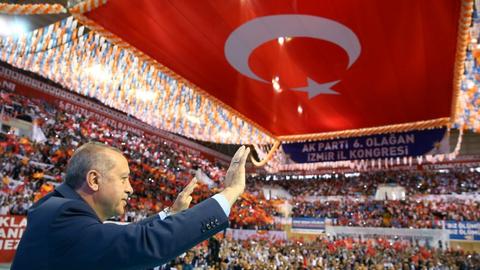By Gökhan Bacık, Ahval
Just a few hours after a gunman killed 50 people in two mosques in New Zealand last week, Turkish President Recep Tayyip Erdoğan showed footage of the attack at an election rally. This symbolises much about Turkey’s understanding of global politics.
In days past, Turkey would adopt a cautious attitude toward terror attacks abroad. Until almost the end of the last decade, a major pillar of Turkish foreign policy was to show there was no clash of civilisations between Muslims and others, and that it was incorrect to view global politics through the lens of rival cultural blocs.
Turkey even saw itself as a leading proponent of intercultural and inter-religious dialogue, co-sponsoring the United Nations Alliance of Civilisations project in 2005 in an attempt to defuse tensions and encourage action against extremism.
But given how Erdoğan and other Turkish leaders reacted to the attack in New Zealand, it is apparent that Turkey is now embracing a completely different diplomatic mindset.
Turkey now believes a clash of civilisations or cultures is the very essence of global politics. Religion is a major factor in this new warfare. Thus, very much during like the Cold War era when the government demanded Turks be alarmed against the communist threat, the government now repeatedly and loudly alerts its citizens to the ongoing conflict. Turkish political leaders invest great time and effort persuading Turks of the imminent threat of the intercultural war in global politics.
The government also openly tells the people that Turkey is a target of the new cultural warfare. Erdoğan declared the attacks in New Zealand were directly against him and Turkey (to be fair, the New Zealand attacker did mention killing Erdoğan and many Turks among the objectives in his manifesto).
But this narrative requires a new role for Turkey, one that is quite the opposite that it used to claim, of a bridge between the East and the West. Now Turkey tells its citizens it is a frontline between cultures.
Two major dynamics prevail behind Turkey’s embrace this interpretation of global politics. The first is Islamism, which reads global politics through the lens of religious metaphors, such as the Crusades, or the cross versus crescent. Islamism sees a competition of cultural, religious or civilisational blocs. In this view, material factors such as trade are not completely rejected, but seen as secondary issues.
The second dynamic is the failure of the ruling Justice and Development Party (AKP) in the economy. With inflation at 19.7 percent, unemployment at 13.5 percent and the lira falling 28 percent against the dollar last year, the country has entered recession and the AKP is convinced an economic collapse is inevitable. It has thus chosen Islamist nationalist populism as a survival strategy. Erdoğan wants people to focus on existential problems rather than issues such as the price of onions or potatoes.
But where is this war? Who is the enemy? Who are the allies? What does Turkey want to defend or destroy?
Many pundits have argued that a rift with the West is now inevitable given the ideological transformation in Turkish politics. They point to Russia and China as alternative new partners to Turkey.
But I think that, analysing Erdoğan’s response to the New Zealand attack, we should infer something else. Erdoğan wants a rift with the West, but has no intention of joining an alternative bloc. Instead, what he and his allies dream of is an inward-looking Turkey, intentionally isolated in global politics and distanced from the outside world.









